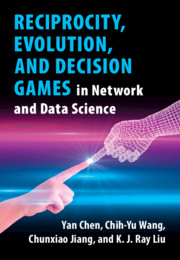Book contents
- Frontmatter
- Contents
- Preface
- 1 Basic Game Theory
- Part I Indirect Reciprocity
- Part II Evolutionary Games
- Part III Sequential Decision-Making
- 11 Introduction to Sequential Decision-Making
- 12 Chinese Restaurant Game: Sequential Decision-Making in Static Systems
- 13 Dynamic Chinese Restaurant Game: Sequential Decision-Making in Dynamic Systems
- 14 Indian Buffet Game for Multiple Choices
- 15 Hidden Chinese Restaurant Game: Learning from Actions
- 16 Wireless Network Access with Mechanism Design
- 17 Deal Selection on Social Media with Behavior Prediction
- 18 Social Computing: Answer vs. Vote
- Index
12 - Chinese Restaurant Game: Sequential Decision-Making in Static Systems
from Part III - Sequential Decision-Making
Published online by Cambridge University Press: 01 July 2021
- Frontmatter
- Contents
- Preface
- 1 Basic Game Theory
- Part I Indirect Reciprocity
- Part II Evolutionary Games
- Part III Sequential Decision-Making
- 11 Introduction to Sequential Decision-Making
- 12 Chinese Restaurant Game: Sequential Decision-Making in Static Systems
- 13 Dynamic Chinese Restaurant Game: Sequential Decision-Making in Dynamic Systems
- 14 Indian Buffet Game for Multiple Choices
- 15 Hidden Chinese Restaurant Game: Learning from Actions
- 16 Wireless Network Access with Mechanism Design
- 17 Deal Selection on Social Media with Behavior Prediction
- 18 Social Computing: Answer vs. Vote
- Index
Summary
In a social network, agents are intelligent and have the capacity to make decisions so as to maximize their utility. They can either make wise decisions by taking advantages of other agents’ experiences through learning or make decisions earlier to avoid competition from huge crowds. Both of these effects – social learning and negative network externality – play important roles in the decision-making process of an agent. In this chapter, a new game called the Chinese restaurant game is introduced to formulate the social learning problem with negative network externality. Through analyzing the Chinese restaurant game, we derive the optimal strategy of each agent and provide a recursive method to achieve the optimal strategy. How social learning and negative network externality influence each other under various settings is studied through simulations. We also illustrate the spectrum access problem in cognitive radio networks as one application of the Chinese restaurant game. We find that the Chinese restaurant game-theoretic approach indeed helps users make better decisions and improves overall system performance.
- Type
- Chapter
- Information
- Publisher: Cambridge University PressPrint publication year: 2021

